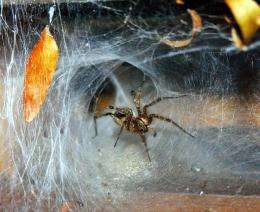August 3, 2012 weblog
Study finds cannibalism helps some spiders produce more offspring

(Phys.org) -- Researchers have known for years that many female spiders kill their mates, either before or after mating and some even eat them, and while many theories have arisen as to why this occurs, this newest instance appears to be the most bizarre yet. A team of biologists from the University of Pittsburgh have found, as they describe in their paper published in the journal Animal Behavior, that females of one species of spider that eat males, tend to produce thicker egg cases out of which emerge more hatchlings, than those that don’t.
The researchers, led by Aric Berning, set out to learn more about why the common female funnel grass spider quite often eats male spiders that come near, prior to copulation, which would seem counterproductive, unless it’s seen as a sign of discrimination, i.e. they only eat the ones they don’t want to have as a mate. To learn more they captured a bunch of the spiders and brought them back to the lab. The females were allowed to build webs, and then males were subsequently dumped into them to see what would happen under different circumstances. They found that the females were likely to eat any male that arrived if they were hungry, or just feeling particularly aggressive. In other scenarios, they found the females a little more discerning, allowing some to mate with them, while eating others. In some extreme cases they found some females that refused to eat any males at all, and some that ate every male no matter what else was going on.
But they found something else too. In instances where the females dined on a male or two before eventually copulating and producing young, the egg cases they produced tended to be a little more robust than usual and inside of them, were more young than were found in egg cases produced from females that had not eaten males prior to producing the cases and offspring. So it seems that eating a few suitors before giving birth appears to give the females some added vigor in producing and protecting offspring, something that has never been observed in any species before.
The researchers don’t know why things work out this way, but speculate that eating males might offer the perfect combination of vitamins and minerals for assisting with case production, or perhaps it prompts a hormonal response. Either way, it appears that the relationship between male and female funnel web spiders is much more complex than it might appear at first glance.
More information: Sexual cannibalism is associated with female behavioural type, hunger state and increased hatching success, Animal Behaviour, In Press, www.sciencedirect.com/science/ … ii/S0003347212002916
Abstract
Precopulatory sexual cannibalism may represent the most extreme form of sexual conflict because it necessarily truncates the reproductive potential of the victim. Three of the most prominent mechanisms invoked to explain incidence of precopulatory sexual cannibalism are the ‘adaptive foraging’, ‘aggressive spillover’ and ‘mate choice’ hypotheses. These hypotheses argue that sexual cannibalism is either (1) the result of female choice, where females gauge the benefits of suitors as perspective mates versus prey, (2) a neutral (or deleterious) by-product of selection on aggressiveness in nonreproductive contexts, or (3) a mechanism by which females express their mating preferences, respectively. We tested the predictions of these hypotheses in the funnel-web spider Agelenopsis pennsylvanica using staged laboratory encounters. We then tracked numerous fitness proxies of cannibalistic versus noncannibalistic females to determine whether cannibalism was associated with increased female performance. We found that more aggressive females and those deprived of food were more likely to engage in precopulatory cannibalism. Cannibalism was not associated with male condition, male body size or female body size, nor with the mass of females' egg cases, the number of eggs therein, or the mass of individual eggs. In contrast, there was a positive association between the mass of the egg case and the number of offspring that emerged in cannibalistic females, but not in noncannibalistic females. Thus, offspring of cannibalistic mothers appear to have increased hatching success in heavier egg cases. This may represent a novel advantage associated with sexual cannibalism.
via BBC
Journal information: Animal Behavior , Animal Behaviour
© 2012 Phys.org




















